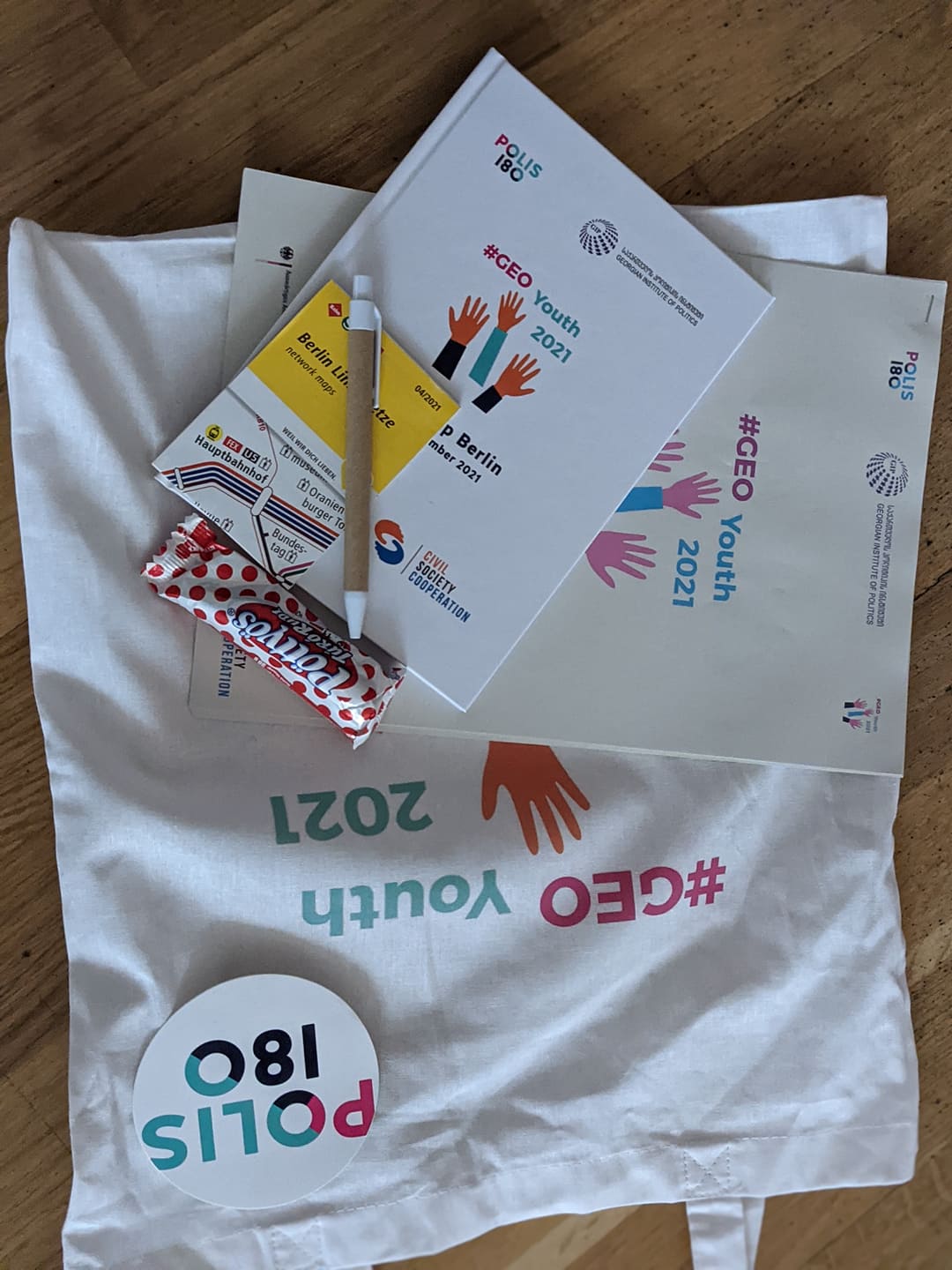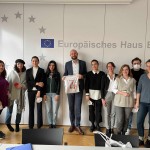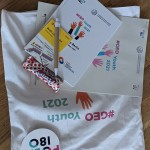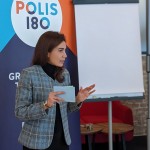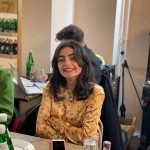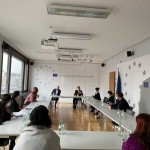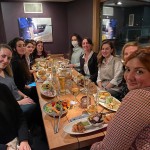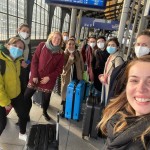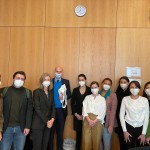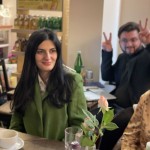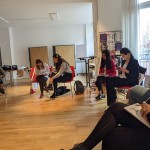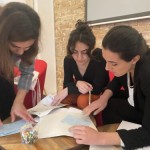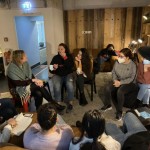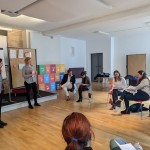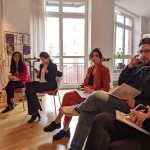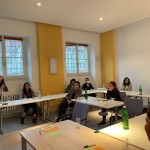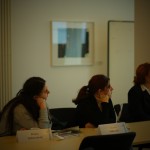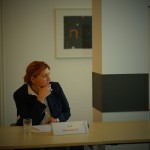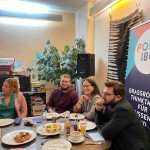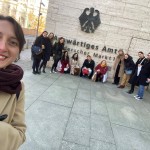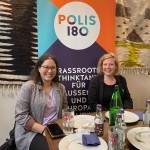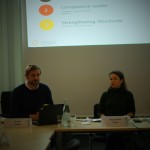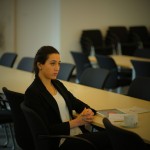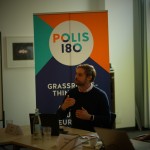Report | #GEOYOUTH2021 Study Trip to Berlin (9-13 November)
Taking Georgian-German cooperation on youth engagement to the next level – this is the goal of our #GEOYOUTH project series. Our journey started in the spring of 2020, right in the turbulent beginning of the global Covid19 pandemic. Personal exchanges have consequently been limited and preparations tedious; but in the end, we managed to bring a group of ten participants and partners from Georgia to Berlin for a 5-day study visit to meet local stakeholders thriving for increased youth participation in Germany, Europe, and beyond.
A report by Frauke Seebass
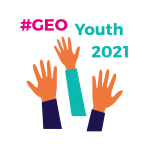
DAY 1
After a long flight and thorough security checks, the group led by our partners from Georgian Institute of Politics (GIP) arrived at BER airport. Our welcome dinner at Pasta & Passione restaurant was marked by several surprises: Our waitress turned out to come from Georgia herself and was overjoyed to welcome our international group. In addition, it was one of the participant’s birthday! Tamar loved the cake, but was even more grateful for the opportunity to come to Berlin – “This has been my dream!”
DAY 2
Out of 56 groups applications, we chose 8 group projects from all across Georgia and supported them financially and with trainings throughout 2021. Each group sent one person to Berlin to represent them. As they all had very different backgrounds and experiences, we used the first morning for a warm-up session, with the kind support of the International Alumni Center. Through a specially prepared quiz and a series of energisers, we tested their knowledge on German, Georgian and European politics, got to know each other more and explained the purpose and agenda of the trip.
In the afternoon, we visited Bundesnetzwerk Bürgerliches Engagement (National Network for Civic Society, BBE), where we were furthermore joined by Armin Pialek from Deutsche Stiftung Engagement und Ehrenamt (German Foundation for Engagement and Volunteering, DSEE). Nino Kavelashvili introduced us into the BBE and its founding principles, followed by Margarethe Finger, who presented the ‘Engaged Land’ Program and learnings from their work with rural communities all across Germany. Armin not only explained the purpose of the state-founded Foundation but also added his own experiences working with civil society actors in the South Caucasus. All three speakers were impressed by the projects implemented within the GEOYOUTH2021 framework and encouraged their representatives to form alliances with like-minded national and international partners to increase their impact and engage in common learning and funding opportunities. During the rich discussion, everyone agreed that local impact can only come from within the local communities, which is one reason the selected projects were so meaningful.
Our final destination for the day was the Georgian Embassy in Germany, located in Tiergarten district. His Excellency Ambassador Levan Izoria has been a firm supporter of our project from the start, and he and the embassy team were excited to learn about the outcome of this year’s efforts. Each participant had the chance to present their project activities and results in detail. Mr. Izoria congratulated them on their success and was visibly impressed by what the group had achieved with limited means in what for many of the was their first experience as a civil society initiator. The meeting concluded with a small reception, during which the guests and embassy staff continued their exchange and networking.
DAY 3
Thursday started with a visit to the Federal Foreign Office, where we met with Kristina Steltzer, Deputy Head of Department 207 (Southern Caucasus and Central Asia), and Benedikt Zanker, Head of Department 205 (Section for EU relations with Eastern Europe and the Eastern Partnership Countries) to discuss Georgian-German civil society cooperation, the EU Eastern Partnership framework, and where Germany stands in relation to the ongoing political crisis in Georgia. For several years the German Foreign Office has been supporting civil society organisations in the Eastern Partnership countries and Russia – including #GEOYOUTH – as a part of their three-pillared foreign policy approach combining political, economic, and cultural and educational dimensions. While this support continues to show impressive results, as the participants demonstrated, change in these countries must be triggered from within – international partners can be supportive, but not coercive in this process, as the ministry representatives emphasised.
After a quick lunch, we headed to Deutscher Bundesjugendring (German Federal Youth Council), where Katja Pfeiffer explained the work of her jump Team in collecting the needs and demands of rural youth to be included in the European Youth Dialogue. The Youth Dialogue enables young people and youth organisations to participate in political and decision-making processes at the local, national and European level. The impact of the Youth Dialogue is made transparent, so young people can understand the influence they have on local political processes right up to the EU. With Katja, we discussed common challenges and possible solutions for youths outside urban centres when it comes to civil engagement, and found many similarities between Germany and Georgia: All of them had also been mentioned in the Manifesto created by our #GEOYOUTH2020 participants!
In the evening, Polis180 had the pleasure to introduce our Georgian guests to one of our signature event formats, the Polis Teatime. This approach aims at facilitating a dialogue between experts and youths in a non-formal setting, in this case at Café MadaMe in Berlin-Kreuzberg, focusing on youth participation in local processes in Georgia and Germany. Magdalena Patalong from Dekabristen e.V., who has many years of experience in collaborations with civil society organisations in Eastern Europe and the Caucasus, provided an input on examples and best practices from her work. #GEOYOUTH2021 grantee Roland Baghaturia from Senaki municipality followed with his insights and ideas on how to make youth engagement more efficient and meaningful, including through digital tools. The ensuing discussion between German, Georgian and international guests sparked a multitude of new ideas and connections, and ended with a spontaneous guitar performance and joined singing.
DAY 4 / 5
For the final meeting of our study visit, we were hosted by Tobias Maaßen at the European House in Berlin. As representative of the European Commission in Germany focusing on the Eastern Partnership, Mr. Maaßen provides a link between German and European policy approaches and was eager to learn about the participants’ project activities and experiences. The role and image of the EU in Georgia, fighting disinformation and possibilities for increased political youth participation were among the main topics of discussion., Our young experts used the opportunity to share their practical knowledge and ideas, as well as asked various questions on the EU’s strategic approach towards Georgia and the wider region.
After this very fruitful final exchange, the afternoon was dedicated to sightseeing, followed by the goodbye dinner at Van Loon Restaurant Ship in Berlin’s Urban Harbour, which concluded the study trip with a number of traditional Georgian toasts by changing tamadas. The more formal evaluation on Saturday morning mirrored the impression that the already very high expectations for this visit were indeed exceeded, and we parted ways knowing that truly meaningful connections had been created.
Polis180 and GIP wish to thank all participants, partners and guests for their fantastic contributions, preparations and inputs, and we look forward to keeping up this vibrant exchange together!
#GEOYOUTH2021 is funded by the German Federal Foreign Office in the framework of the programme “Expanding Cooperation with Civil Society in the Eastern Partnership Countries and Russia”.
#civilsocietycooperation
Project term
01 March- 31 December 2021
Our supporters
The project is funded by the German Federal Foreign Office in the framework of the programme “Expanding Cooperation with Civil Society in the Eastern Partnership Countries and Russia”.


